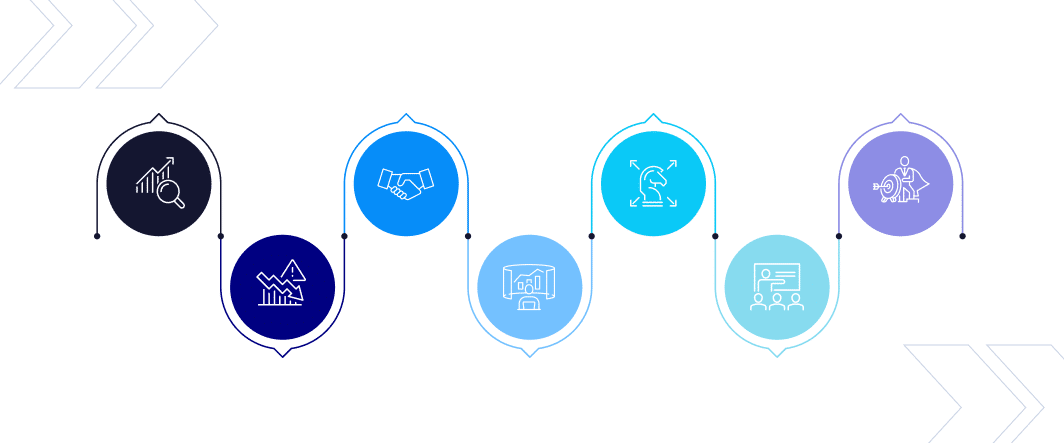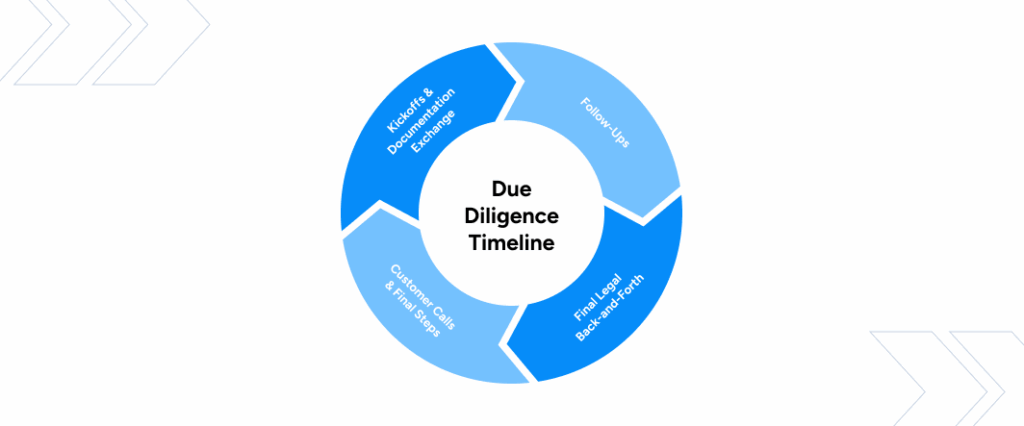7 Reasons to Hire an M&A Advisor When Selling a Software Company

In some corners of the business world, “ready, fire, aim” is all the rage. It’s rooted in the belief that it’s better to move forward quickly and correct course later.
But when it comes to seeking investment for your SaaS business, that’s exactly the wrong approach. Pulling the trigger too soon before you’ve taken note of your surroundings, properly positioned yourself, and set your sights in the right place is a surefire way to shoot yourself in the foot.
In fact, you could wind up leaving significant money on the table by rushing through the process.
Investing the time to aim carefully with smart positioning and expert guidance is what will help you reach the right target when you’re ready to sell.
That’s true not just in terms of bringing in the highest possible monetary return but also making sure your business lands in trustworthy hands who will safeguard what you’ve built, including your reputation and long-term vision.
Here’s why you need an M&A advisor like SEG by your side.
Navigating the terrain takes time and teamwork.
Most software leaders only sell a company once. But the best advisors have led dozens, often hundreds, of transactions, which gives them a critical advantage.
The right advisor with experience in your industry, and who takes the time to truly understand your business from the ground up can help you not only tell your story but put you on a better footing to multiply the rewards.
Again and again, we hear stories about company founders who wound up with seller’s remorse. Maybe they were rushed with a single buyer who wound up controlling the process, because there were no other suitors in the room to create competitive tension.
Or maybe a buyer approached the company with an attention-getting offer that then got chipped away at over time, until the seller wound up accepting a disappointing deal because they’d already invested so much time and effort (the “sunk costs” sinkhole).
Running a process without an advisor risks more than just a lower valuation. It can lead to unfavorable terms, lost leverage, damaged relationships, and missed opportunities.
Fortunately, these are the kind of pitfalls that can be avoided when you’ve got an experienced guide on your team, one who knows the terrain because they’ve traveled the path before.
Take Robert Johnson. Years before engaging with SEG, he tried to sell a company without a banker, and the deal, in his words, “failed epically.” So, when it came time to exit TeamSupport, the software company he’d built over a decade, he knew what was at stake. “SEG built the narrative, the materials, the CIM and told our story in a way that made buyers lean in and compete. They saw value where we hadn’t, and that changed everything.”
An advisor asks the right questions.
Often, the SaaS companies we guide through an M&A process are surprised by how many questions we ask upfront.
But details lead to leverage. The data we gather is the ammunition that helps us aim for that bullseye. It surfaces insights that make it possible to capitalize on strengths and shore up weaknesses. We zero in on the metrics and KPIs that with some extra attention will deliver the most value.
It also helps us identify and attract the right prospects who will make a more substantial commitment because they recognize your value.
Asking and answering smart questions in the early stages, when there’s still plenty of room to maneuver, puts you in the best competitive position.
John Hinckley, who was the CEO of Modern Message before selling to RealPage, said using an M&A advisor positioned the company to appeal to multiple buyers, something he doesn’t think he could have done on his own.
“Selling a business is incredibly personal. It’s emotional. It is exhausting. It’s a marathon. It’s not a sprint. And so, as we kicked it off, I was really impressed with how SEG helped us analyze our business, understand our business, captured all the data across our business, and helped us put the story together in the CIM. They discovered things about the business that I didn’t even know. They discovered strengths about my customer retention that I wasn’t even fully aware of, and they knew how to put the story together the right way.”
They let you focus on your business.
The M&A process, done right, requires a lot of attention to achieve a successful exit. At the same time, it’s important not to diminish your focus on the essentials of running your business. One of the worst things that can happen is seeing your numbers slip due to missing sales quotas or experiencing increased customer churn. That can negatively impact your valuation just as you’re moving toward a sale.
A typical M&A process can involve 50 to over 200 targeted buyers, multiple lawyers, accountants, management teams, and other third parties. Advisors add tremendous value in managing communications and relationships, sharing information and analysis, and directing the timing and steps of a transaction.
If you try to do all this alone, the amount of focus that you and your team wind up putting into the deal can diminish its ultimate value.
Johnson, of TeamSupport, said releasing this pressure was key for him. “Selling your company while running it is like having two full-time jobs. You can’t afford to drop the ball on either. SEG helped me juggle both. They managed the process, kept things moving, and prospective buyers engaged, which let me stay focused on leading the business. That balance, and their guidance, made all the difference.”
SEG takes care of the heavy lifting. We also serve as gatekeepers to manage and evaluate offers as they come in, easing your response burden and making sure you don’t get overwhelmed by the volume of calls and conversations.
When you’re ready to have the right conversations, we’ll make sure you’re armed with the data and narrative details you need to make a successful case.
The best markets are created, not found.
Most experienced investors know that single-buyer conversations often favor the buyer, not the seller. But competition drives better outcomes. Every time.
Competitive tension maximizes valuation because it focuses buyers’ attention and compels them to put their best offers on the table. An experienced M&A advisor knows how to build a market for your company. The right process gives you options, improves deal structure, and maximizes value beyond just the headline number.
Advisors structure the stages and timeline so potential buyers have ample time to understand the opportunity and get up to speed.
Advisors who have deep SaaS expertise also know how to present recurring revenue models, customer dynamics, and growth opportunities in ways that increase buyer conviction, as well as competitive tension.
Dr. Jacquelyn Kung was a former investment banker. She built her SaaS business, Activated Insights, with an exit in mind. “It’s very difficult being directly in touch with a group of buyers. Not only does it derail your day-to-day work and what you’re doing, but also, there’s no buffer between you and the buyer in terms of some of these negotiations.”
Though she had the background to run her own process, she hired SEG, who built competitive tension and moved her deal to a close even when it was threatened in the final days. She estimates that using an advisor helped her achieve 66% more than she would have on her own.
Buyer responsiveness matters.
Plenty of advisors claim to “know” buyers. But it takes more than just contact information to create a real connection. The ability to get buyers to respond and engage meaningfully is what makes the difference. That in turn depends on relationships that are based on value and trust.
At SEG, we rigorously track buyer responsiveness. Across our curated buyer lists, we see an average response rate of 85%. That kind of access and credibility comes from deep industry expertise and a track record of delivering high-quality opportunities.
Real relationships lead to real conversations. That’s what moves deals forward.
Advisors reduce your risk.
As important as the financials are, they’re not the whole story when selling a SaaS company. Delegating the M&A process to a firm with sell-side M&A expertise helps ensure the deal happens as smoothly as possible. As experts who execute transactions for a living, M&A advisors can eliminate the risks of running a process alone by:
- Leveraging the right resources at the proper stages before going into due diligence to help avoid red flags, re-trading, or the deal falling apart
- Negotiating key deal terms to ensure that the transaction is fair, transparent, and acceptable to all parties
- Ensuring buyers are doing the appropriate level of diligence to understand business dynamics
The right advisor maximizes your return.
Selling or seeking investment in a SaaS company is the culmination of years of hard work, risk-taking, and strategic execution. Getting to the best possible valuation requires a thoughtful process, and you deserve a steady and experienced partner to guide you.
The ROI of using an advisor far exceeds going it alone. For Tad Fallows, working with SEG to sell his business iLab Solutions paid off. “We achieved an outcome that exceeded my objectives, both in financial terms and in the long-term success of our employees and customers. I know without a doubt that retaining SEG was the highest ROI investment we ever made as a company.”
SEG has helped hundreds of SaaS leaders achieve extraordinary outcomes. Whether you’re evaluating your options or already speaking with buyers, we’d welcome a conversation.
Get in touch and let us show you what’s possible.









